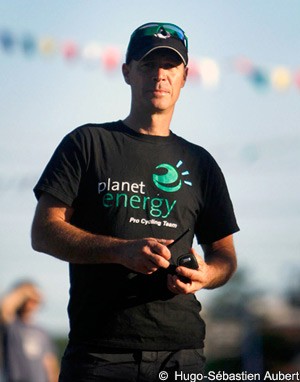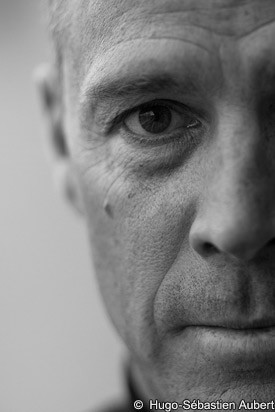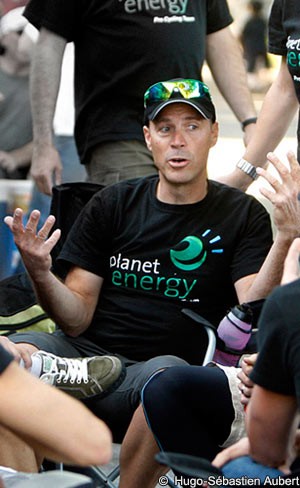Former top pro passing on his knowledge to Canada’s young riders
 On the eve of Canada’s Team Spidertech Powered By C10 making their debut in the ‘Major League’ of European cycling at the Trofeo Laigueglia – where Canadian Ryan Anderson would take 13th place on the first stage – the man behind the team, Steve Bauer, took time to talk us about his own past and his thoughts on his team’s future.
On the eve of Canada’s Team Spidertech Powered By C10 making their debut in the ‘Major League’ of European cycling at the Trofeo Laigueglia – where Canadian Ryan Anderson would take 13th place on the first stage – the man behind the team, Steve Bauer, took time to talk us about his own past and his thoughts on his team’s future.
Bauer first came to prominence with the Canadian track team as a team pursuiter in the late 70’s before turning to the road.
He took three consecutive Canadian road race titles in the early 80’s but his greatest achievement as an amateur was a silver medal in the road race at the 1984 Olympic Games in Los Angeles. He and the American rider Alexi Grewal rode clear of the rest of the field, sprinting it out for the win between them.
Turning pro soon after the race, his second outing in the cash ranks was the 1984 world professional road race championship around the tough Montjuich circuit in Barcelona. Remarkably, the Canadian walked away with the bronze medal behind Claude Criquielion and Claudio Corti.
It was the start of a pro career which would see him wear the yellow jersey of Tour de France leadership, stand on the podium of classics and win the Dauphine Libere. Four years later, Criquielion’s name would crop up again in Bauer’s story, when the two tangled at the finish of the worlds in Ronse, Belgium.
Having retired in 1996, he is now highly involved in cycling once again, and has the goal of trying to help Canada’s young talented riders to make the most of their abilities.
The Spidertech project hasn’t come about overnight as the result of a major cash injection, but has been developed organically by Bauer over the last three seasons to where it is now: solidly in the ranks of the UCI Professional Continental teams, and with plenty of ambition for the future.
Bauer was in Carcassonne at the team’s early season European base when he spoke to VeloNation.
VeloNation: You turned pro at 25, Steve – do you look back and wish you had done so earlier?
Steve Bauer: I guess there’s a time for everything, I was initially riding the track at international level before I turned to the road…and I guess I was a late developer.
VN: You took a worlds medal in your second pro ride?
SB: Yes…I was ready for it, I was in great shape. I’d been training with Greg LeMond and Phil Anderson in the Spanish mountains. It was when I trained with them that I realised that as a track rider I hadn’t been training long enough – with them I was doing back-to-back six and seven hour rides, and began to evolve as a rider.
VN: We have to ask you about the pro Worlds in 1988 when Claude Criquielion alleged you caused him to crash in the final sprint, costing him the title.
SB: It was a major distraction…he sued me, and it wasn’t an easy time. The case took a lot of time and effort – it was a pain in the ass and dragged on for five years before it turned out as it should and was dismissed. It was just one of the moments that happen in sport.
I see him at races from time to time but we avoid each other – we stay at least two metres away from each other.
 VN: In 1990 Eddy Planckaert beat you by a tyre’s width for Paris-Roubaix; do you still have nightmares about that one?
VN: In 1990 Eddy Planckaert beat you by a tyre’s width for Paris-Roubaix; do you still have nightmares about that one?
SB: That was one of the best races I ever rode…I had a lot of track experience but hadn’t seen that finish on the Roubaix velodrome. What’s interesting about that finish is that neither of us got a good bike throw in…the finish line on the Roubaix track comes upon you very quickly out of the banking.
My regret is that I hadn’t ridden a few laps of the velodrome before the race – that would have been smart of me!
VN: Are you happy to have been a pro when you were, or would you prefer to be a pro now?
SB: It’s certainly good to have made my career before EPO, I’m proud to have raced on water. But now is a good time for Canadian guys to be pro and to be on the Pro Tour
VN: Your best memory of your pro career?
SB: It would have to be taking the yellow jersey, then leading the race for five days and finishing fourth overall in 1988 Tour de France. But I also look back with satisfaction on the rides I did in the one day classics – Roubaix, Flanders and the Worlds.
The Worlds at Chambery in 1989 when LeMond won was one of my best days. I was in great shape – I’d just
won the Championship of Zurich – but I punctured on the last lap.
VN: Tell us about Steve Bauer Bike Tours, which you ran after your pro career ended.
SB: I did them for 12 years from 1997 and still do them but don’t market them – they’re a good fit with the team, for sponsors and VIPs. I was approached about being a DS many times; but it’s about timing and fit. I was intrigued by what was happening in Canadian cycling, I could see an evolution taking place and I could see that working with a local team could lead to a higher level.
VN: It was 2008 you started seriously with Team RACE.
SB: That stands for ‘Race Against Cancer Everywhere’ and we began to build what is now Spidertech from there.
VN: In 2009 the team became Planet Energy…
SB: Yes, they’re an energy retailer dispensing energy, mainly to corporations. They remain as one of the C10 companies who sponsor us for 2011.
VN: Can you tell us about that?
SB: The success of our first three years was built on collaborations with CEOs of Canadian companies who are passionate about cycling. We want to have ten companies backing us…so far we have six. We feel that there’s better sustainability with multiple sponsors.
For example, one of our sponsors is BlackBerry. Their Jim Balsillie wants to help us and believes in us. We want to have broad strength…and sustainability.
VN: How was dealing with the UCI?
SB: Very black and white, ‘there’s the rule book’ – they’re not much help. It’s a matter of understanding what’s needed but they’re vague about things they shouldn’t be. It’s not helpful that it’s not clear how the applications for the World Tour are evaluated, for example.
VN: You are on Canadian bikes, namely Argon…
SB: Yes, it’s a natural fit, they’re evolving with us in terms of design and improvement – we grew together and their R & D has good direction.
VN: Being outside the list of ProTour teams, wildcard slots and selection are very important. How are the invites to races going?
SB: They’re going quite well…there have been a few disappointments, but we’re very excited about having qualified for races like the Tours of California and Turkey. We have a very good programme in Belgium and France with races like the GP E3, Brabantse Pijl, Dwars Door Vlaanderen, GP Cholet and Three days of West Flanders. We’re all excited, but not over confident.
 VN: Signing Svein Tuft was a bit of luck…
VN: Signing Svein Tuft was a bit of luck…
SB: It was a very spontaneous situation…when Pegasus collapsed, Svein had a few options but wanted to race with a Canadian team. He didn’t wait around, we spoke, made him a respectable offer and he said; ‘I’m in!’
It was a merging of moons.
VN: David Veilleux seemed like a natural for Spidertech, being Canadian, but he went to Europcar…
SB: We approached him but it is confusing why he didn’t take our offer; we’ve tried to get him on board for the last three years – but it’s his decision. We have two Worlds medallists on board in Svein Tuft (silver Elite TT 2008) and Guillaume Boivin (bronze U23 road race 2011) so we’re very happy with the riders we do have.
VN: What’s your take on the drugs ‘war’?
SB: I can only comment from the outside, it’s not something I’ve ever been involved with in any way. With the biological passport and 24/7 whereabouts it’s hard to believe that guys are still stupid enough to take sh*t. I think that the attitude of US teams like HTC and Garmin to the problem has provided a good lead.
VN: 2011 will be successful for Spidertech, if . . .
SB: Well, we don’t have any specific goals to win this race or that race. But with riders like Svein and Guillaume on the roster, it’s within our reach to win a stage race. I also think that the podium in a semi-classic isn’t beyond us; but we’ve just entered Division 2 and in year one I don’t think you can be crazy optimistic.
That said, what we’re doing has never been done before in Canadian Cycling. It’s an enormous challenge – but it feels good!